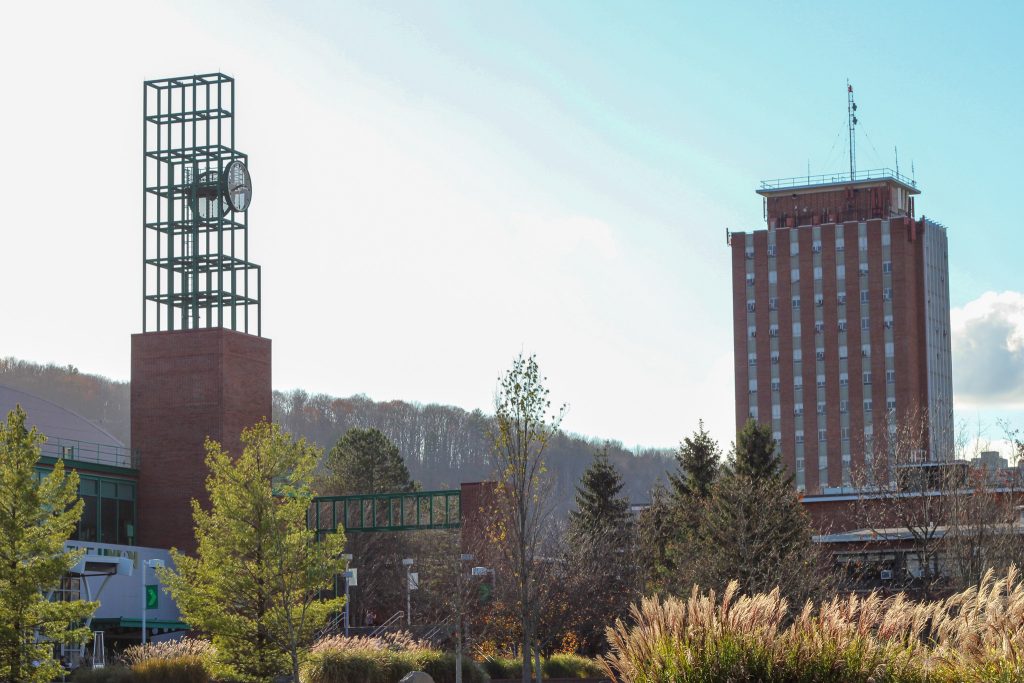SUNY Broome Community College (BCC) may soon be one with Binghamton University.
On Dec. 1, BU President Harvey Stenger announced that the University was pushing forward a plan to further integrate with BCC, whose main campus is located on Upper Front Street in Binghamton. According to the announcement, the two institutions have been discussing the integration over the past few months. The plan is now being pushed forward to the SUNY Board of Trustees for further consideration.
Stenger said the plan is still in its early stages, and described the work needed to bring the concept to reality.
“While SUNY and local leaders have expressed support for the concept, many more conversations and negotiations need to be held that will include academic and administrative leaders on both campuses,” Stenger wrote in the announcement. “Administratively, we will need to establish new practices, rules and regulations. These would include things such as how to report statistics of students from each campus separately, how to integrate administrative staff and systems, how to manage the fiscal identity of each campus separately, changes to our accreditation and others.”
While the initial announcement did not provide many specifics on what the integration would look like, Silvia Briga, director of marketing, communications and public information for BCC, said more details will come as the proposal moves forward.
“As our discussions are still at a very early stage, further information will be provided as we progress,” Briga wrote in a statement. “[BCC] will be working closely with [BU] to coordinate updates and communications. We anticipate further details may be available after the holidays. These matters are complex and will take time to work through.”
Stenger described the potential benefits of the integration if it is approved, including, “providing a clearer path for student transfers from [BCC] to [BU], resulting in greater academic success for those students” and “lowering administrative costs through economy of scale.” Another described benefit would be increased attendance for BCC, according to Stenger, as enrollment has declined for BCC over the past few years while it has risen for BU.
Stenger described how these “challenges” were a key consideration behind the proposal.
“Given these challenges, I believe that an integration of University and community college functions would have positive impacts on both institutions as well as the community,” Stenger wrote. “And most of all, it would improve educational outcomes for transfer students, especially those coming from first-generation and underrepresented minority backgrounds.”
Both schools already work together through the Binghamton Advantage Program (BAP), which sees admitted students live on the BU campus while attending classes at BCC. Nicolas Rampelotto, an undeclared freshman enrolled in BAP, said that while he was “happy” about the proposal, he was concerned for what it might mean for his education.
“I also feel that it would make my future as a [computer science] major unclear, because what are they going to do with me?” Rampoletto wrote in an email. “Are they going to label the [Applied Technology] building at [BCC] an extension of Watson, for example? I guess time will tell.”
Other BAP students expressed more support for the proposed integration.
Melissa Lopez, an undeclared freshmen enrolled in BAP, expressed hope that the integration would continue to support BAP, and give more students the transition period before university that she received.
“With the drastic changes compared to high school — the extremely large campus, the larger classes, the highest expectations — I think I might have crumbled under pressure,” Lopez wrote in an email. “Yes, there are resources to use to help me on both campuses, but it really is an overwhelming amount of responsibilities at once. But, with this program I can experience a trial of college before the University to better myself to meet those expectations.”



